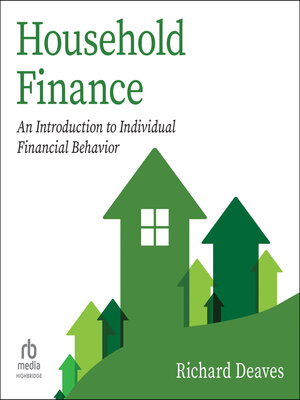Household Finance
audiobook (Unabridged) ∣ An Introduction to Individual Financial Behavior
By Richard Deaves

Sign up to save your library
With an OverDrive account, you can save your favorite libraries for at-a-glance information about availability. Find out more about OverDrive accounts.
Find this title in Libby, the library reading app by OverDrive.



Search for a digital library with this title
Title found at these libraries:
| Library Name | Distance |
|---|---|
| Loading... |
Household Finance: An Introduction to Individual Financial Behavior speaks to both how people should and how people actually do make financial decisions, and how these financial decisions contribute to and detract from their well-being.
Author Richard Deaves covers the broad range of choices and goals in household finance both in the normative sense (i.e., what is best) based on conventional financial theory and in the positive sense (i.e., what is actually done) based on observing actual behavior. While modern finance builds models of behavior and markets based on such strong assumptions as the rationality of decision-makers, behavioral finance is based on the view that sometimes people behave in a less-than-fully-rational fashion when making financial decisions.
Deaves addresses important issues and puzzles in the field including financial illiteracy, whether education and advice can improve outcomes, intertemporal consumption optimization, consumption smoothing, optimal dynamic risk-taking, the stock market participation puzzle, the credit card debt puzzle, anomalous insurance decisions, mortgage choices, skewness preference, investments driven by availability and attention, local and home bias, the disposition effect, optimal pension design, and improving outcomes through nudging in a thoroughly international approach.
Author Richard Deaves covers the broad range of choices and goals in household finance both in the normative sense (i.e., what is best) based on conventional financial theory and in the positive sense (i.e., what is actually done) based on observing actual behavior. While modern finance builds models of behavior and markets based on such strong assumptions as the rationality of decision-makers, behavioral finance is based on the view that sometimes people behave in a less-than-fully-rational fashion when making financial decisions.
Deaves addresses important issues and puzzles in the field including financial illiteracy, whether education and advice can improve outcomes, intertemporal consumption optimization, consumption smoothing, optimal dynamic risk-taking, the stock market participation puzzle, the credit card debt puzzle, anomalous insurance decisions, mortgage choices, skewness preference, investments driven by availability and attention, local and home bias, the disposition effect, optimal pension design, and improving outcomes through nudging in a thoroughly international approach.







